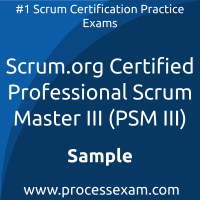 You have to pass the PSM III exam to receive the certification from Scrum.org. To increase the effectiveness of your study and make you familiar with the actual exam pattern, we have prepared this Scrum.org Professional Scrum Master sample questions. Our Sample Scrum.org Professional Scrum Master III Practice Exam will give you more insight about both the type and the difficulty level of the questions on the Scrum.org PSM 3 exam.
You have to pass the PSM III exam to receive the certification from Scrum.org. To increase the effectiveness of your study and make you familiar with the actual exam pattern, we have prepared this Scrum.org Professional Scrum Master sample questions. Our Sample Scrum.org Professional Scrum Master III Practice Exam will give you more insight about both the type and the difficulty level of the questions on the Scrum.org PSM 3 exam.
However, we are strongly recommending practice with our Premium Scrum.org Certified Professional Scrum Master III (PSM III) Practice Exam to achieve the best score in your actual Scrum.org PSM III Exam. The premium practice exam questions are more comprehensive, exam oriented, scenario-based and exact match of Scrum.org Professional Scrum Master III exam questions.
Scrum.org Professional Scrum Master Sample Questions:
01. In facilitating diverse perspectives, a Scrum facilitator should:
(Select two)
a) Promote consensus on all decisions
b) Encourage respectful dialogue and understanding
c) Ensure their own opinions are adopted
d) Create an environment where different ideas are valued
02. Agile practitioners understand that the best approach to planning and forecasting may vary depending on the __________.
a) team's preference
b) project budget
c) specific situation
d) time of year
03. Self-managing teams are effective in dealing with complex problems because:
(Select two)
a) They rely on a single leader for direction
b) They distribute workload evenly
c) They encourage diverse perspectives and solutions
d) They are more flexible in their approach
04. Empirical process control in Scrum involves which of the following?
a) Inspection, Adaptation, Transparency
b) Planning, Execution, Monitoring
c) Command, Control, Coordination
d) Design, Development, Deployment
05. Which Scrum Values are directly involved in promoting an empirical approach?
(Select two)
a) Openness
b) Focus
c) Commitment
d) Courage
06. How does the Scrum Value of 'Respect' manifest in a team setting?
a) By adhering strictly to the planned tasks
b) By valuing each team member's ideas and contributions
c) By completing tasks independently
d) By ensuring that all team members are always in agreement
07. What is the primary difference between the Definition of Done and acceptance criteria?
a) The DoD applies to product features, while acceptance criteria apply to the Sprint
b) The DoD is defined by the Scrum Master, whereas acceptance criteria are defined by the Product Owner
c) There is no difference between the two
d) The DoD is a shared understanding of what it means for work to be complete, whereas acceptance criteria are specific conditions for a specific item
08. Mentoring in a Scrum team focuses on:
(Select two)
a) Directing the team's technical tasks
b) Building a relationship based on trust and guidance
c) Assisting in personal and professional development
d) Making key project decisions
09. In agile release planning, the focus is on delivering __________.
a) extensive documentation
b) the highest value features first
c) all requested features
d) features in the order they were requested
10. The Definition of Done and the Increment relate to each other how?
(Select two)
a) The Increment must meet the Definition of Done
b) The Increment is independent of the Definition of Done
c) The Definition of Done guides the development of the Increment
d) The Definition of Done is only relevant for the Product Backlog
Answers:
Question: 01
Answer: b, d |
Question: 02
Answer: c |
Question: 03
Answer: c, d |
Question: 04
Answer: a |
Question: 05
Answer: a, d |
Question: 06
Answer: b |
Question: 07
Answer: d |
Question: 08
Answer: b, c |
Question: 09
Answer: b |
Question: 10
Answer: a, c |
If you find any errors or typos in Scrum.org Certified Professional Scrum Master III (PSM III) sample question-answers or online Scrum.org PSM 3 practice exam, please report them to us on feedback@processexam.com
 You have to pass the PSM III exam to receive the certification from Scrum.org. To increase the effectiveness of your study and make you familiar with the actual exam pattern, we have prepared this Scrum.org Professional Scrum Master sample questions. Our Sample Scrum.org Professional Scrum Master III Practice Exam will give you more insight about both the type and the difficulty level of the questions on the Scrum.org PSM 3 exam.
You have to pass the PSM III exam to receive the certification from Scrum.org. To increase the effectiveness of your study and make you familiar with the actual exam pattern, we have prepared this Scrum.org Professional Scrum Master sample questions. Our Sample Scrum.org Professional Scrum Master III Practice Exam will give you more insight about both the type and the difficulty level of the questions on the Scrum.org PSM 3 exam.